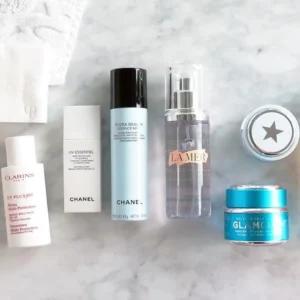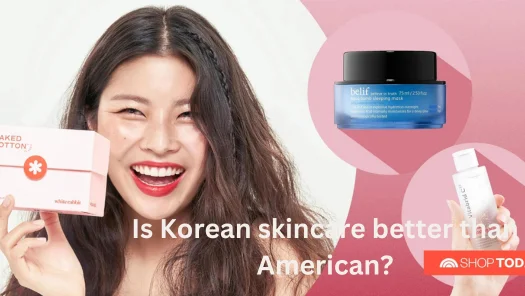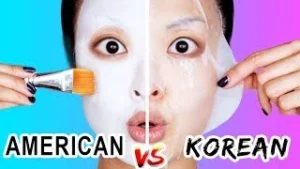Is Korean Skin Care Really Superior? An Investigation
Korean skincare has long piqued Western interest because to its shelfie-worthy packaging and emphasis on unusual ingredients like snail mucus and fermented rice water. Thanks to TikTok, brands like CosRx, Innisfree, and Laneige have achieved viral social media notoriety, while Dr. Jart+ and Glow Recipe are now essentially household names.
In addition to piqueing interest, Korean skin care has made a name for itself as one of the most reliable and effective cosmetic product categories. And a significant revival is taking place in advance of winter. Google’s skin-care trends over the past several weeks have included searches for “Korean skin-care routine,” “10-step Korean skin care,” and “best Korean skin-care products.” While on TikTok, a few new films with the hashtag #koreanskincare have amassed millions of views apiece.
lose-up shots show a woman washing her face.
Korean skincare has long piqued Western interest because to its shelfie-worthy packaging and emphasis on unusual ingredients like snail mucus and fermented rice water. Thanks to TikTok, brands like CosRx, Innisfree, and Laneige have achieved viral social media notoriety, while Dr. Jart+ and Glow Recipe are now essentially household names.
In addition to piqueing interest, Korean skin care has made a name for itself as one of the most reliable and effective cosmetic product categories. And a significant revival is taking place in advance of winter. Google’s skin-care trends over the past several weeks have included searches for “Korean skin-care routine,” “10-step Korean skin care,” and “best Korean skin-care products.” While on TikTok, a few new films with the hashtag #koreanskincare have amassed millions of views apiece.
Using a Korean Scrub to Remove Toxins and Dead Skin Cells
Macro Beauty | Refinery29 Using a Korean Scrub to Remove Toxins and Dead Skin Cells | Macro Beauty | Refinery29
A tweet and TikTok video from skin-care blogger @Mul_OVO that highlighted the advantages of switching to Korean skin care went popular in October. But is skin care from Korea really superior? Or have we just fallen victim to the hype?
Our infatuation with K-skincare, according to cosmetic chemist and licensed esthetician Esther Olu, began with ‘glass skin’—skin that is so dewy that it nearly appears reflected. Glass skin, according to Olu, was the ideal and pushed criteria for “luminous” and “healthy-looking” skin. “Everyone wanted to have healthy skin,” explains Olu, “and Korean [skin care] has played a critical role in this mindset.”

Compared to Western products
Which can be harsh, the Korean approach to skin care is significantly kinder and the ingredient lists are noticeably different.
You could say that promoting healthy, happy skin is the primary goal of skin care worldwide. But there are some significant variations. Retinol and exfoliating acids, such as glycolic, lactic, and salicylic acid, tend to be the focus of many Western skin-care fads (such as skin cycling, peels, and rediscovering skin toners). These are fantastic when utilized appropriately and wisely under the direction of a professional, but when overused as many of us have a tendency to do they can be really annoying.
Dermatologists nearly always list perioral dermatitis
A red rash that surrounds the mouth, burns, irritation, dryness, and a damaged skin barrier, which can result in redness, tightness, breakouts, and rashes. Use of excessive amounts of harsh drugs is the cause of all of these ailments.
Of course, the aforementioned components are present in Korean skin care products. They are effective after all. According to Olu, the Korean strategy appears to be much kinder, and the ingredient lists also differ noticeably. For instance, PHAs (polyhydroxy acids) are far more common in Korean skin care. Consider the freshly released Pore Remedy line from Dr. Jart+, which features PHAs as its main component. PHAs effectively exfoliate the skin in a similar way to glycolic and salicylic acids, but what distinguishes them from other exfoliators is their big molecule size. They do not go too deeply and irritate the skin like other acids may, only exfoliating at the surface. Just a few Korean companies, including Glow Recipe and CosRx, are supporting them and advocating a gentler approach to the contentious exfoliating craze.
In reality, in recent times, Korean skin care has saved our inflamed skin barriers. Rather than drying out skin, a large portion of Korean skin care products focus on minimizing inflammation. According to cosmetic chemist Ramón Pagán, “promoting hydration as well as soothing ingredients is a primary focus in Korean skin care.” This is in contrast to the products we frequently encounter in the west, which often include higher concentrations of active chemicals and may be more astringent or irritating to the skin.
The Western method of Korean skincare
According to Pagan, has been centered on stripping skin: getting rid of the “bad” things like excess oil and clogged pores.. This is because of skin-care marketing in the early 2000s. Korean skin care, on the other hand, focuses on nurturing the skin. Western skin care can be uncomfortable, especially for people with dry, sensitive, or acne-prone skin, agree Reddit’s skin-care enthusiasts.
Olu backs this up. She tells R29 that “Western skin-care products typically take a corrective approach.” The formulations contain various exfoliating acids, including retinol, azelaic acid, BHAs, and AHAs, each of which is “particularly devoted to fixing a skin-care condition.” According to Olu, “Korean skin care focuses more on maintenance and skin barrier health, whereas [Western skin care] is meant to help with anti-aging and things like redness.”
Because of this, the majority of Korean skin care products contain effective ingredients like ceramides (which are very moisturizing and keep the skin barrier together), centella asiatica, also known as cica (an herb that lessens inflammation, redness, puffiness, and swelling), and niacinamide (vitamin B3, which maintains the skin barrier and reduces excess oil). the current TikTok viral hit color-correcting cream? It is obviously Korean and contains cica.
The Korean government is claimed to have actively invested in its beauty brands to better develop cosmetics, which may be one reason why Korean skin care is so well-liked and effective.
Additionally, Redditors point out that Korean skin care uses’special compounds’ and technology that aren’t included in Western products. Influencers and experts praise products like CosRx Advanced Snail 96 Mucin Power Essence Gel, which contains the moisturizing component snail mucin (excreted from snails). Dr. Kemi Fabusiwa recently remarked, “This is a great barrier-protecting ingredient, but it also gives your skin a great shine.”
Then there’s bee propolis, a naturally occurring substance made by honey bees that has been shown to smooth skin and protect it from environmental factors like pollution, as well as allantoin, a popular ingredient in Korean skin care for locking moisture into the skin, rice extract (said to increase hydration, making skin plump), and other ingredients.
In addition to using components that are more intriguing and kind to the skin, it has been said that Korean beauty and skin care is one of the nation’s greatest industries and exports. South Korea is the third-largest exporter of cosmetics in the world, and its exports will surpass those of smartphones, home appliances, and prescription drugs in 2020. Additionally, data indicates that by 2026, the skin care market in South Korea would be worth $11.4 billion. It’s interesting to note that the Korean government is claimed to have actively invested in its beauty brands in order to better develop cosmetics, which is one of the reasons why Korean skin care is so well-liked and effective.
According to Nina Vargas Korean skincare
A global business strategist for beauty, fashion, and wellness firms, “K-beauty was introduced to the Western market through popular channels and social media, a phenomenon was awakened, creating demand and opportunity for business.” This made it possible for Korean cosmetics businesses to get assistance from the Korea International Trade Association (KITA). KITA is a nonprofit company that assists small and medium-sized businesses in expanding internationally.
Furthermore, according to Dr. Jenelle Kim, the founder and formulator of JBK Wellness Labs, Korean skin care incorporates the most recent research to comprehend the precise requirements of our skin. While committing to formulating with time-tested ingredients and, for some brands [like Erborian, Sulwhasoo, and Beauty of Joseon], the medicinal properties of herbal remedies, it makes use of ingredients in novel ways. For instance, ginseng and green tea are quite well-liked.
According to Dr. Kim Korean skincare
Environmental factors such as hormones, air quality, and makeup trends can all affect our skin’s demands. To keep us in balance, Korean skin care has continually changed the rules. Pagán concurs that Korean skin care has a rich history. According to him, several companies employ “hanbang” components, which are based on conventional Korean medicine. “These are frequently naturally derived and herbal.” Highlighting medicinal skin care makes Korean products seem reliable and successful, putting them above other products in the post-pandemic era when we are more concerned than ever with maintaining our health.
In essence, skin care is ingrained in Korean culture.
You may check out how Koreans consider beauty as a necessity rather than a luxury by going to TikTok. Many videos show that people are taught from a young age to care for their skin and look at skin care as protection. A high-strength, broad-spectrum sunscreen is considered one of the essential products of modern living, and annual sun protection is another popular product among grooming enthusiasts.
Another factor contributing to Korean skin care’s high regard is the affordability of the bulk of its products. You can find skin care enthusiasts exchanging reviews of Innisfree, Tonymoly, and Etude House on Reddit. Their key selling point is the assurance of calmed, hydrated skin, but so are the generally affordable prices—the majority of cleansers, serums, and creams cost under $25.
It makes sense that we would want to spend as little money as possible on beauty products during a time of rising living expenses. However, cutting corners when it comes to Korean skin care doesn’t mean sacrificing quality. Aside from being employed in formulas with sensitive concentrations. All of the tried-and-true ingredients for skin care, such as acids and retinol, are included. Some TikTokers even make the claim that Korean skincare frequently imitates expensive brands and products with very similar ingredients and outcomes. “Whether you spend $1 or $100 is irrelevant. Vargas believes that if it’s K-Beauty, it probably is fantastic.
The 10-product routine has made way for routines with fewer steps throughout time.
Not everyone can get away with too many procedures, especially if they’re on a budget or have sensitive, recurring, or acne-prone skin. But Korean skin care products are always changing and adjusting according to customers’ needs. That’s why the three- or four-step routine is now popular among Koreans. The TikTok user shared a simple skincare routine that always starts with a gentle, hydrating cleanser, followed by a moisturizer, moisturizer, and sunscreen. Dermatologists and other skin care experts often recommend this simple treatment for all skin types because it’s fast and effective.
According to Pagán, Korean skin care is still fun and inventive. You can afford premium experiences, and it’s simple but effective. Western companies rarely acquire fundamental Korean ideas like fermented foods and snail secretion.
When you consider the money spent and the importance of supporting skin rather than removing “bad” elements, it’s clear why Korean skin care is so revered.
But is it better? In essence, the finest skin care is the one that works best for you. By the way, if it’s Korean, it’s great. But if it’s something entirely different, why alter it? Korean skincare.
We at Refinery29 are here to assist you in navigating this confusing world of goods. The editorial team individually chooses and curates each of our market recommendations. Refinery29 could receive a commission if you purchase something from a link on our website.




